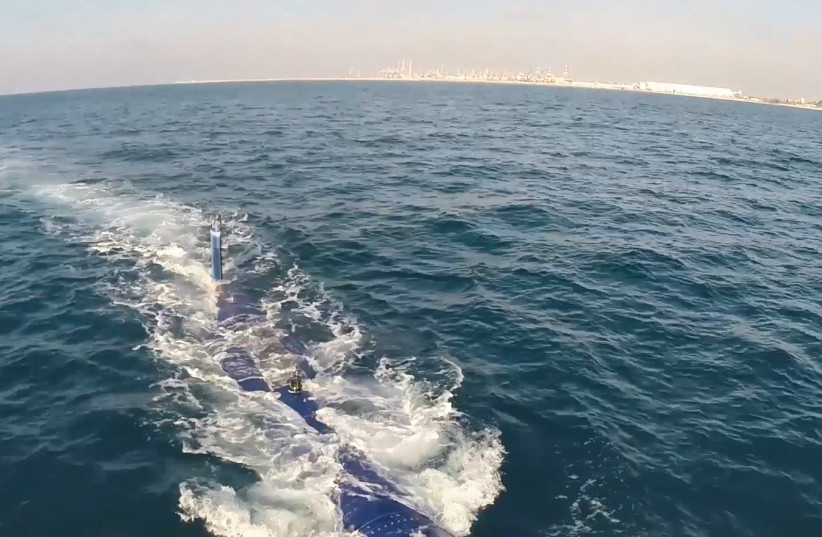Israel Aerospace Industries on Thursday revealed a first-ever and potentially game-changing Israeli-made unmanned mini-submarine. It is expected to expand the IDF’s intelligence-gathering capabilities and significantly reduce maintenance and training costs.
The 12-meter-long “BlueWhale” mini-submarine is intended for covert intelligence-gathering operations. It can detect submarines and gather acoustic intelligence. It could be the start of a future in which the Israel Navy shifts to more unmanned vehicles that require fewer sailors.
In addition, the vehicle’s small size, which is possible because it does not need room for human operators, makes it much harder for enemy forces to detect than many current options in the navy.
The large autonomous underwater vehicle (AUV) has successfully conducted thousands of hours of submerged and autonomous operations.
BlueWhale uses radar and electro-optical systems, “fitted to a telescopic mast, to detect sea and coastal targets,” IAI said in a press release.

Where would they send it?
While IAI would not specify in which intelligence areas it has already performed surveillance, two major targets of Israeli naval intelligence are the Gaza Strip coast and the Lebanese coast.
Surveillance in those areas focuses on a mix of preventing attacks, thwarting weapons smuggling and gathering intelligence about enemy forces.
The mini-submarine is also equipped with “dedicated sonars to enable the detection of both manned and unmanned submarines, and map mines on the seabed.”
In addition, a special sensor suite ensures safe transit for the submarine both below and in the proximity of the sea surface, on which it is also capable of “landing.”
More specifically, the mini-submarine can drop down at least a few hundred meters underwater.
The AUV is capable of remaining out at sea for periods of several weeks at minimal cost and maintenance, without the need for operators on board.
Unlike naval personnel, it does not get tired or homesick, and it does not need gas during its missions.
All of this could lead to huge financial savings for the navy, and IAI expects to sell dozens of the AUVs to Israel and globally.
“By using a satellite communications antenna on the mast, the gathered data can be transferred in real-time to command posts, anywhere in the world, at sea or on land,” IAI said.
“Submarine detection and acoustic intelligence-gathering data is enabled using a sonar several tens of meters long, towed by the BlueWhale, and by flank array sonar with receiver arrays attached to both sides of the platform,” it said.
“In parallel, mine detection is performed using a dedicated synthetic aperture sonar, attached to the sides of the vessel,” IAI said. “The BlueWhale has a sensor suite to help ensure its safe transit underwater or near the surface. In recent years, a number of international patents have been registered regarding development of the system.”
According to Yoav Tourgeman, an IAI vice president and CEO of its subsidiary Elta, which focused on the AUV, “BlueWhale joins the family of land, sea and space-based unmanned platforms developed by IAI, and it represents a force-multiplier for submarine fleets. Based on its advanced engineering capabilities, IAI’s Elta Group has for the first time in the world managed to bring to maturity the development and production of an autonomous underwater system able to perform a wide range of tasks.”
“BlueWhale is a significant member of IAI’s family of maritime products, which include solutions for use in economic exclusion zones, tools for managing autonomous vessels and their integration in monitoring the maritime arena,” he said.
